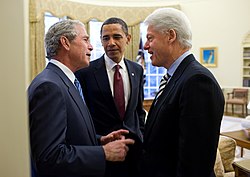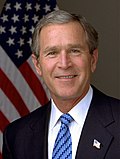| Founded | January 16, 2010 |
|---|---|
| Founder | Bill Clinton George W. Bush |
| Location |
|
Area served | Haiti |
| Method | Donations and grants |
| Website | www |
| ||
|---|---|---|
Personal 40th and 42nd Governor of Arkansas 42nd President of the United States Tenure Appointments Presidential campaigns  | ||
| ||
|---|---|---|
Business and personal
46th Governor of Texas 43rd President of the United States
Tenure Presidential campaigns  | ||
The Clinton Bush Haiti Fund was a 501(c)(3) nonprofit organization founded on January 16, 2010, by former US Presidents Bill Clinton and George W. Bush, to aid the victims of the 2010 Haiti earthquake. The organization was formed in response to the request of President Barack Obama for the former Presidents to assist in the Haitian rescue effort. [1] The fund concluded formal operations on December 31, 2012. [2]
Contents
The Clinton Bush Haiti Fund's efforts focused primarily on longer-term reconstruction, especially supporting job creation, workforce development, and the promotion of economic opportunity. [3] The fund's stated purpose was to support the restart, expansion and creation of micro, small and medium-sized enterprises, to which women are often key contributors; empower people and enterprises by helping them access the formal business sector; promote job creation (particularly jobs with direct social benefit, such as in health and education); and to provide life skills and job training, especially to youth, so that Haitians can embrace economic opportunity. [4]





